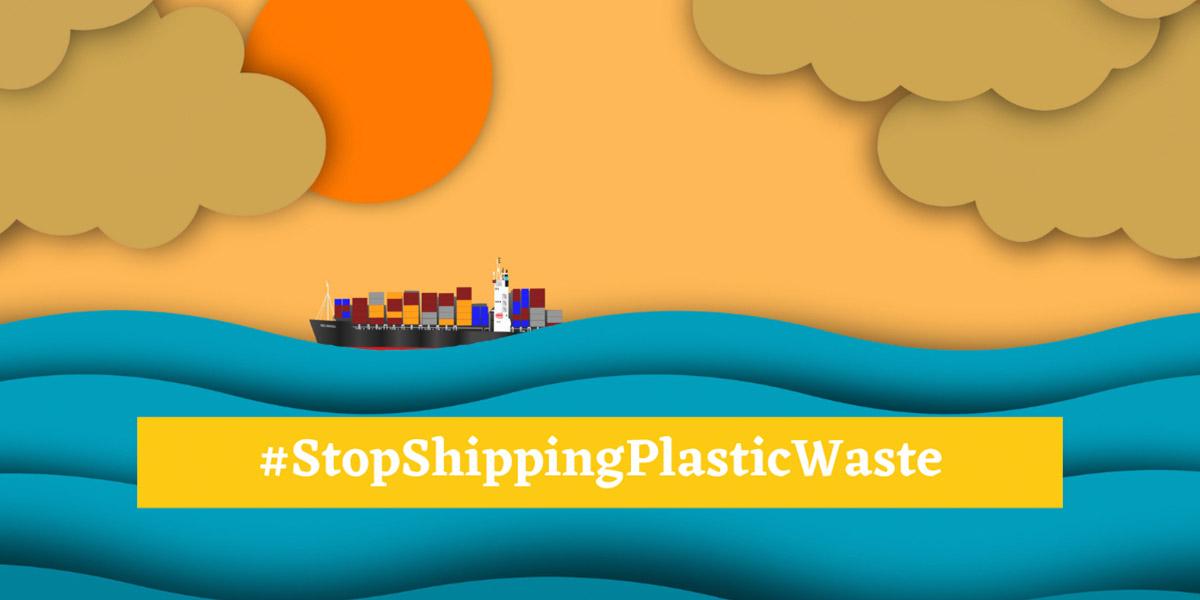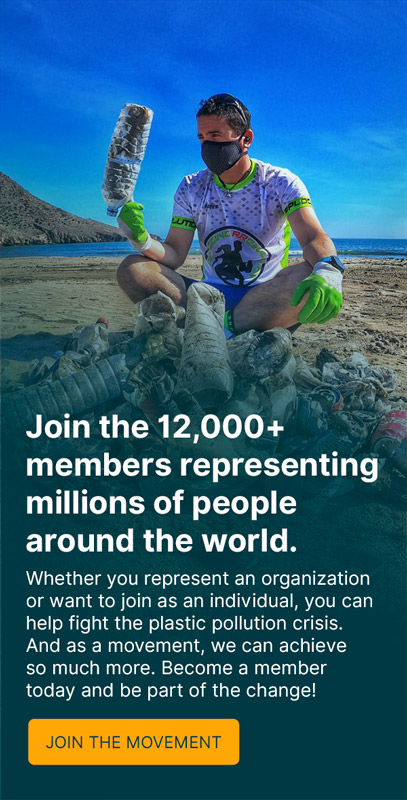The event was co-organised by Break Free From Plastic (BFFP) and the European Environmental Bureau (EEB), in partnership with the Geneva Beat Plastic Pollution Dialogues.
You can access the live recording and detailed summary of the event here.
The United Nations Sustainable Development Goal 14 stresses the need to ‘conserve and sustainably use the oceans, seas and marine resources for sustainable development’. Yet, conversations on ocean pollution rarely touch upon the plastic waste trade, wherein high-income countries ship their plastic waste to the majority world.
Plastic waste shipments contribute enormous amounts of plastic pollution, microplastics, and chemical additives to the ocean — irrevocably harming our health, wildlife, and ecosystems. The export of plastic waste creates the delusion of circularity for a material that is inherently linear, allowing us to perpetuate our dependence on plastics.
Inspired by the documentary ‘The Recycling Myth’, this panel tackled the issue of plastic waste trade with experts from around the world:
• Patrizia Heidegger, Director for Global Policies and Sustainability at the European Environmental Bureau, Belgium
• Dr Sedat Gündoğdu, Associate Professor, Cukurova University, Turkey
• Dr Daru Setyorini, Program Development Manager, ECOTON, Indonesia
• Jane Bremmer, Campaign Coordinator, National Toxics Network, Australia
• Jan Dell, Chemical Engineer & Founder of The Last Beach Cleanup, United States
• Benedict Wermter, Co-Director of The Recycling Myth, Germany
The session was moderated by Pui Yi Wong, Waste Trade Coordinator, Break Free From Plastic - Asia-Pacific.
Waste trade is a key creator and conduit of marine pollution. Research indicates that plastic waste trade contributes significantly to ocean plastic pollution, marine microplastics, and toxicity in the environment, especially around illegal dumpsites where burning occurs. When transported to countries ill-equipped to manage waste, plastic destined for recycling often leaks into rivers and oceans. Allowing plastic waste trade to continue renders all downstream efforts to stop ocean plastic pollution futile.
The panel discussed both sides of the argument - how the developed countries of the Global North view the trade, and how the developing countries from the Global South receive the dirty exports. The production, manufacture, use, disposal via export, dumping or incineration is the issue, yet the chemical pollution during this plastics lifecycle is the invisible threat to the world’s oceans as well as the planet, and all its biodiversity.
Waste exportation from high consuming countries reflects the colonial exploitation of the majority world. The materials exported are inherently polluting and toxic, and necessitate large amounts of natural resources to process. Despite industry claims, plastics are not recyclable indefinitely, nor is the material circular. When waste is exported, countries shift the blame of who is responsible and foist technical false solutions upon communities in the developing world.
Some of the panel’s key recommendations are:
• We need to reduce the production of plastics, enhance local waste management systems and encourage zero waste practices to effectively tackle ocean plastic pollution.
• Ending plastic waste exports from rich to weaker economies is important to phasing out plastic production, and reducing marine pollution and its negative impacts on marine and human life.
• Partnerships between governments, non-governmental organisations, community groups, waste picker groups, shipping companies, plastic waste exporters and importers, plastic waste recyclers, etc, are vital to phase out the trade of plastic waste.
The takeaway messages from this panel included:
1. We made a huge mistake when we started producing plastic - we need to turn back the tide. Plastics are everywhere and our solutions need to be multi-pronged.
2. To curb plastic production and consumption, we must counter false solutions like chemical recycling, incineration and waste trade.
3. If we are serious about a circular economy, we must rethink plastics, phase out the chemical additives, and redesign systems by following zero waste principles.
4. A plastic waste shipment ban can help develop local waste infrastructure in both developing and developed nations, such as segregation, collection, and recycling capacity. Each country must deal with their own plastic waste.



